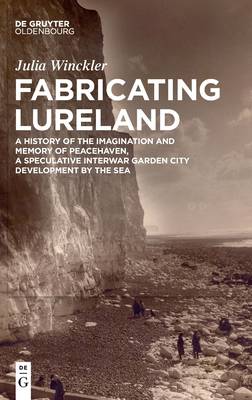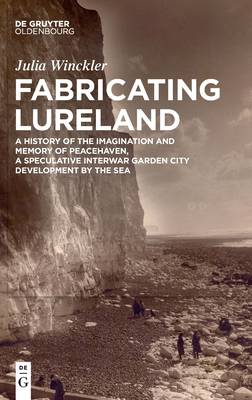
- Afhalen na 1 uur in een winkel met voorraad
- Gratis thuislevering in België vanaf € 30
- Ruim aanbod met 7 miljoen producten
- Afhalen na 1 uur in een winkel met voorraad
- Gratis thuislevering in België vanaf € 30
- Ruim aanbod met 7 miljoen producten
Zoeken
Fabricating Lureland
A History of the Imagination and Memory of Peacehaven, a Speculative Interwar Garden City Development by the Sea
Julia Winckler
Hardcover | Engels
€ 120,95
+ 241 punten
Omschrijving
Through the analysis of surviving archival traces, this book constructs a history of the imagination and memory of the town of Peacehaven. Built as a speculative development atop iconic chalk cliffs on the Sussex Coast and marketed as a garden city by the sea, the estate quickly attracted adverse publicity. Influential voices such as the Bloomsbury group's Virginia and Leonard Woolf, architect and writer Clough Williams-Ellis and the Campaign for the Protection of Rural England soon began to criticise it as a blot on the rolling, pastoral downland. Instead of reading and appraising Peacehaven's story in a polarized way, this book breaks new ground by critically interpreting visual representations and commissioned photographs of the Estate and re-evaluating propositions from its inception, which aspired to secure improved public health and home ownership in direct response to the negative impact of industrialization and WWI. Focusing on the interwar period and tracing mutating agendas, the book investigates contested marketing and construction narratives through Histoire Croisée methodology and its intercrossings with memory and the imagination. By combining visual and creative research methods with oral history, multi-layered narratives of place come into focus. The study tracks the visual programme of the developer's in-house magazine, Peacehaven Post, alongside previously underexplored blueprints, photographs, postcards and promotional guidebooks, and considers the garden city narrative as a form of social Utopia. Garden city ideals are once again evoked in debates as a potential solution to the ongoing national housing shortage, giving this research additional urgency as new large-scale redevelopment erases many of the few and fast disappearing original landmarks.
Specificaties
Betrokkenen
- Auteur(s):
- Uitgeverij:
Inhoud
- Aantal bladzijden:
- 420
- Taal:
- Engels
Eigenschappen
- Productcode (EAN):
- 9783110735208
- Verschijningsdatum:
- 20/12/2021
- Uitvoering:
- Hardcover
- Formaat:
- Genaaid
- Afmetingen:
- 156 mm x 234 mm
- Gewicht:
- 766 g

Alleen bij Standaard Boekhandel
+ 241 punten op je klantenkaart van Standaard Boekhandel
Beoordelingen
We publiceren alleen reviews die voldoen aan de voorwaarden voor reviews. Bekijk onze voorwaarden voor reviews.











